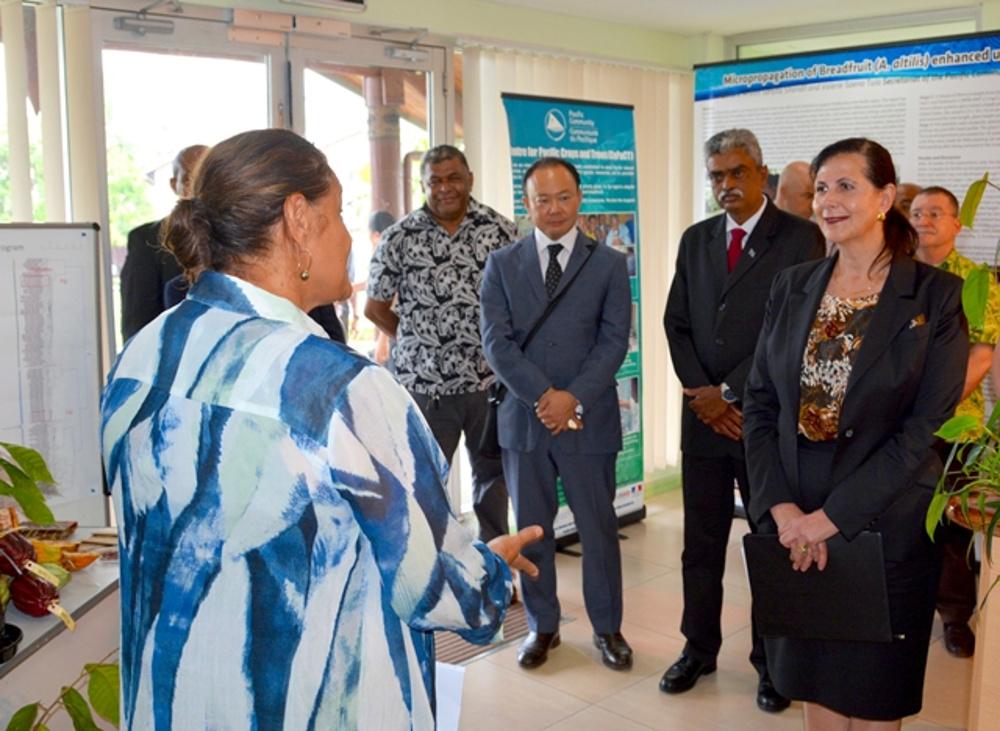Australia’s Minister for International Development and the Pacific, Senator the Hon. Concetta Fierravanti-Wells, reaffirmed support for sustainable agriculture in the region, after a visit to the Pacific Community’s (SPC) Centre for Pacific Crops and Trees (CePaCT) yesterday.
CePaCT is the Pacific’s only internationally recognized gene bank, housing over 2,000 plant tissue cultures, including the largest collection of taro varieties globally. The Centre was established in 1998 with support from the Australian Government - through the Australian Centre for International Agricultural Research (ACIAR) - and the European Union.
During her tour, Senator Fierravanti-Wells witnessed how the Centre helps to conserve the region’s plant genetic resources, improving plant diversity and strengthening food security in the region.
The Minister also took the opportunity to announce additional Australian Government funding of up to AU$250,000 for CePaCT and the opening of an ACIAR office at the Australian High Commission in Suva.
The visit reflects Australia’s commitment to sustainable development in the Pacific, through supporting CePaCT’s work in addressing vulnerabilities of Pacific communities and supporting their development aspirations.
“Australia is both founding member and a valuable development partner of SPC.
“SPC is delighted to be able to host the Hon. Fierravanti-Wells at CePaCT to showcase the successful outcomes of this important partnership, which is particularly timely as SPC celebrates its 70th Anniversary this year,” Pacific Community Deputy Director-General (Suva), Dr Audrey Aumua said.
Following Samoa’s taro leaf blight in the 1990s, Australia played a vital role in supporting a breeding programme that succeeded in the delivery of blight-resistant taro varieties.
“Agricultural research remains a key priority for SPC, and ACIAR continues to play a vital role in supporting these efforts,” Dr Aumua said.
The Pacific region is home to a range of endemic and untapped biodiversity that can sustain global food security. It is one of the world’s biodiversity hotspots, supporting Pacific livelihoods.
While CePaCT is the lead gene bank on taro collection globally, it maintains over a dozen culturally and economically important food crops including banana, breadfruit, cassava, sweet potato and yam. The Centre’s important role in the research has contributed to over 70,000 tissue culture derived plantlets distributed to 51 countries, including 22 Pacific Island countries and territories.
The Centre has also distributed over 200 tissue culture breadfruit seedlings to Fiji’s Ministry of Primary Industries Department of Agriculture for field research, as part of the Pacific Breadfruit Project (PBP), a pilot initiative in Fiji supported through ACIAR.
Media contacts:
Belinda Fraser, Media and Communications Officer, Australia High Commission, [email protected] / [email protected] or +679 338 9389
Lauren Robinson, SPC Media Relations, [email protected] or + 679 337 9250
About us:
The Pacific Community (SPC) is the principal scientific and technical organisation in the Pacific region, proudly supporting development since 1947. It is an international development organisation owned and governed by its 26 country and territory members.
Useful link:
SPC Centre for Pacific Crops and Trees
Video: Australian Minister for International Development & the Pacific visits SPC's CePaCT
